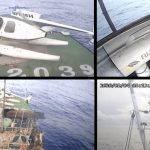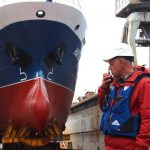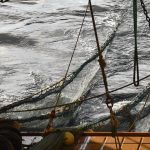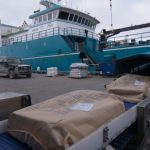A package of measures to support Scotland’s fishermen has been announced.
Speaking from the Fishing Expo 2010 in Glasgow today, Fisheries Secretary Richard Lochhead set out his priorities and thinking on the challenges currently facing the industry.
He announced around £6 million of additional domestic funds will also be made available to support the Fisheries Action Plan. Match funding from the European Fisheries Fund could deliver substantial additional investment into the industry this financial year.
Mr Lochhead added that pressing Brussels and London for ‘immediate and radical changes’ to European fisheries policy would be pursued as ‘a matter of urgency’.
And the Scottish Fisheries Minister called for Scottish boats involved in catch quota trials to be made exempt from the EU’s days at sea regime.
And a new scheme allowing two businesses to transfer their days at sea to one vessel to cut costs will be introduced from next month.
Mr Lochhead said:
“Scotland should be proud of it’s fishing industry. Our fishermen are responsible for bringing the finest seafood in the world to our tables and are leading the rest of Europe with their conservation credentials.
“Of course the past few years have seen the perfect storm for some sectors. A global recession, volatile fuel prices, and a reduction in fishing opportunities for some sectors when they need shelter from rising costs and fluctuating fish prices.
“However the industry is already beginning to take control of its own destiny, breaking new ground on many fronts. These measures are being co-ordinated and given momentum through our Fisheries Action Plan.
“We are maximizing the value of the catch, by reforming the whole supply chain, from net to plate, and tackling the madness of the broken Common Fisheries Policy. Scotland has led Europe by example, so that fishermen can land, and sell, more of the fish they catch, rather than throwing it dead over the side of the boat.
“And we are developing innovative ways in which the industry can share and reduce costs. This will give the Scottish fleet the opportunity to restructure, albeit temporarily, in order to weather the storm. It is optional and reversible. I am confident this offers opportunities across the fleet to improve operating profits.
“We need to cut some vessels’ basic allocations of days, retrospectively, but we are making available new options to vessels by using fishing gear that lets more Cod escape. Over a full year this will allow them to buy back more days than they stand to lose.
“Our innovative catch quota trial has been rolled out to another 21 vessels. We will work to secure full catch quota opportunities for our fleet and make them exempt from days at sea restrictions.
“We are also making substantial domestic resources of £6 million available to support innovative ideas, alongside matched EU funding, subject to Commission approval. This could be used to purchase selective gears, electric auction facilities at Scottish markets – building on Lerwick’s success – and funding research to highlight practices that can maximise the value of the supply chain.
“By sticking together Scottish fisheries can take its rightful place as the most profitable, the most sustainable and best managed fishery in the world.”
The Scottish fishing fleet faces particular challenges in 2010 in achieving a full year fishery, because of significant EU cuts in allocations, made worse by higher fuel costs. There is a risk that fisheries will not be open for the full year. The catching sector and processors agree that it is beneficial to have a 12-month fishery. To increase the chances of achieving this, new conservation measures are necessary to provide fleets with additional time at sea under the EU’s Cod Recovery Plan and to ensure that individual fishermen can rely on being able to use their time at sea later in the year, when demand for fish is at its highest. New measures include the mandatory introduction of larger closed sea areas (in places where Cod are more abundant) for longer periods to increase Scotland’s days at sea, and additional voluntary effort buy-backs through deployment of selective gear. This will introduce new flexibility into the licensing system that will allow vessels to amalgamate their businesses more easily, sharing fishing opportunities and reducing unit costs. The conservation measures were discussed and agreed at the Conservation Credits Steering Group – which includes representatives of the fishing industry, environmental organizations, marine scientists and Scottish Government officials – earlier this week.
The Days at Sea arrangements are part of the EU’s 2008 Cod Recovery Plan. It involves automatic annual reductions in the time that fishing vessels can spend at sea using certain categories of fishing gear, until the NS Cod stock is judged to have recovered fully. The cuts can be offset and effort ‘bought back’ if vessels participate in conservation measures. Scotland, through the Conservation Credits Scheme, has been in the lead in developing such initiatives. Through these initiatives the fleet was able, in 2009, to fish for the full year and at a normal level of effort.
Individual fishermen receive an annual allocation of days at sea from Marine Scotland, and can plan their business accordingly. Producer Organisations are responsible for quota management and can control the rate of fish landings to maximise returns for their members. So whilst the Government ensures overall annual fishing effort is capped, the POs manage the way in which fisheries are spread across the year.There are around 1500 fishing vessels in Scotland directly supporting over 5400 jobs, with many more in the support industries. Of the 1500 vessels, fewer than 400 are affected by days at sea controls. Sixty fewer are involved than in 2009, because the Scottish Government made a successful application to exempt west coast prawn vessels that catch very little Cod.The concept of vessel sharing is that, by allowing multiple existing fishing licenses to be placed on a fishing vessel, some businesses may be able to amalgamate their days at sea and quota allocations and reduce their fixed and variable costs (such as harbour dues, insurance, repairs and other owner expenses) by sharing a vessel, thus generating sufficient operating profit to be financially viable over the short and long term. Alternatively, in fisheries severely constrained by quota and effort it may allow vessels to access additional effort by buying out those who wish to leave the industry and concentrating effort on the remaining vessels – under current licensing rules such an approach is not possible.
On West Coast emergency measures, the Scottish Government has been working with an Industry Task Force to develop a package of alternative measures that would replace or supplement these proposals as well as seeking the removal of prohibitions that have no effect on the capture of Cod, Haddock or Whiting. Discussions have taken place with Commission Officials and a formal proposal of alternative measures will be presented in the coming weeks.








